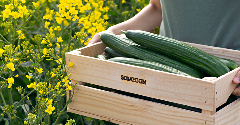News
Livekindly creates New Vegan Food Brands for Chinese market
14 Jul 2021Plant-based company collective Livekindly launched its first brands created in-house. Sold under the names Giggling Pig 咯咭藸 [Ge Ji Zhu] and Happy Chicken 哈皮鸡 [Ha Pi Ji], these brands sell products aimed at Gen Z Chinese customers that are interested in balancing taste, nutrition, sustainability and a “modern twist on heritage cuisine.”
The two brands encompass a portfolio of seven plant-based products based on traditional Chinese dishes, including dumplings, several mushroom-based dishes and a seasoned minced dish. These products were developed and manufactured locally in China in order to authentically appeal to local flavor preferences.

“China is one of the most exciting and strategic markets for the plant-based revolution, and a key pillar of our growth strategy,” Kees Kruythoff, CEO and Chairman of LIVEKINDLY Collective said in a statement. Although China is routinely remarked upon in the media for its population’s growing consumption of meat, Chinese consumers’ interest in plant-based alternatives is also growing rapidly.
In 2018, China’s plant-based market was just shy of $1 billion, but following that benchmark, the market has been projected to grow between 20% and 25% annually, according to data from the Good Food Institute cited by Livekindly. In addition to magnified market growth for plant-based products, the Chinese government is stepping in and offering more clarity and definition to this category. In June, China approved its first standard for labeling plant-based meat products, which are now defined as “foods that are processed with plant raw materials …having texture, flavor, shape and other characteristics similar to those of animal meat products, such as livestock, poultry and aquatic products.”
This standard, issued by the Chinese Institute of Food Science and Technology (“CIFST”), further underscores the potential for rapid growth in the plant-based space within China. Livekindly specifically pointed to this regulatory approval in its press release as an indication for further investment by the collective into brands targeted at the Chinese population.
In fact, since launching last March, Livekindly has raised $535 million, which the company noted was earmarked for plant-based innovation with a special interest in international growth, including expansion into China.
The collective, which was formed by the Swiss alternative protein investment firm Blue Horizon Group and includes brands such as Oumph!, The Fry Family Food Co., LikeMeat, No Meat, and The Dutch Weed Burger, is working to become “the voice of the plant-based movement,” and has already made inroads into 40 countries within the last 12 months. China, however, might prove to be its most interesting market. The company said that it has not only launched its inaugural in-house brands in this country, but it is opening up offices in China to better serve the market.
Related news

Soy story: WWF scores UK supermarkets on sustainability efforts
12 Nov 2025
WWF has published its latest “Soy Scorecard”, ranking UK supermarkets’ efforts to combat deforestation and land conversion in their soy supply chains.
Read more
Standing Ovation and Bel scale up casein production from dairy co-products
11 Nov 2025
Foodtech company Standing Ovation has partnered with cheese specialist Bel Group to manufacture dairy serums for industrial-scale casein production via precision fermentation.
Read more
New UPF standard hoped to offer consumers ‘coherence and clarity’
10 Nov 2025
Ingredients companies are being urged to enter “a new era of partnership and innovation” following the launch of the industry’s first non-UPF verification scheme.
Read more
Whistleblowers accuse UK meat industry of promoting cheap, unsustainable supply
7 Nov 2025
An anonymous group of industry insiders has accused the UK’s biggest food companies of systematically driving down meat quality and welfare standards.
Read more
Bord Bia presents Irish dairy ingredient suppliers at Fi Europe
6 Nov 2025
Dairygold Co-operative Society, The Carbery Group, and Ornua Co-operative: Meet with sustainable producers of Irish dairy ingredients at Food ingredients Europe 2025, Hall 7.2 Stand M18.
Read more
AI attraction means foodtech startups must ‘prove’ rather than ‘promise’
4 Nov 2025
Reports suggest that artificial intelligence (AI) is sucking investment from foodtech and agritech, but investors say the picture is complicated.
Read more
Penguin and Club bars no longer classed as chocolate
30 Oct 2025
Penguin and Club bars can no longer be classified as chocolate after the pladis-owned McVitie’s brands turned to cheaper alternatives amid the ongoing cocoa crisis.
Read more
Could plant-based protection replace plastic packaging?
29 Oct 2025
Swedish foodtech company Saveggy has launched an additive-free plant-based protection for cucumbers, offering a waste-free packaging solution for fruit and vegetables.
Read more
Does promoting protein content push up plant-based sales?
27 Oct 2025
Promoting the protein content of meat-free products is a more effective sales strategy than adding carbon labels, a study of UK bakery chain Greggs suggests.
Read more
Amazon Grocery launch aims to balance quality with affordability
22 Oct 2025
Global e-commerce giant Amazon has introduced a new private-label food brand, combining existing Amazon Fresh and Happy Belly products with new everyday items.
Read more